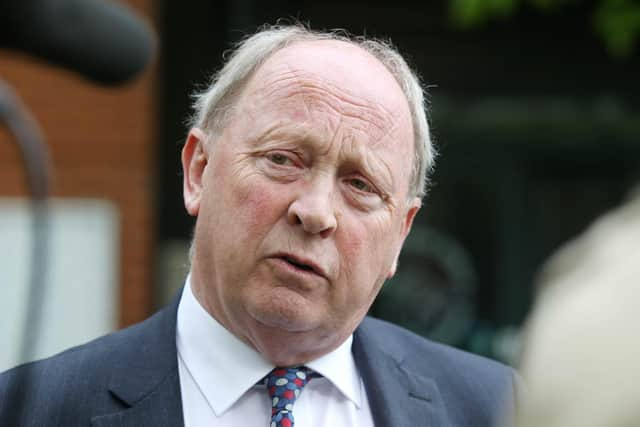Irish Language Act: Major imbalance in powers of Ulster Scots and Irish Language Commissioners says TUV leader Jim Allister
and live on Freeview channel 276
There had been an expectation that Westminster would complete the legislation before May but Secretary of State Brandon Lewis said this week he did not think it right to do so during an election.
However TUV leader Jim Allister has now weighed into the debate - claiming that the proposed British/Ulster Scots commissioner would have much less powers than the proposed Irish Language Commissioner.
Advertisement
Hide AdAdvertisement
Hide AdHe says the draft bill shows that the British/Ulster Scots Commissioner will have powers and a remit which are “minimal” compared to the Irish Language Commissioner.


The functions of the British/Ulster Scots commissioner, he said, are merely to “enhance and develop the language, arts and literature associated with the Ulster Scots and Ulster British tradition” - however he noted although there is no reference to Orange culture “or in indeed any type of culture” in relation to their remit.
“The means by which the [British/Ulster Scots] Commissioner is to exercise his function is to ‘produce and distribute publicity material’.”
Unlike the Irish Language Commissioner, he said, the British/Ulster Scots Commissioner will have no official recognition and will not be empowered to place any performance standards on any public authority.
Advertisement
Hide AdAdvertisement
Hide AdThere will be “no duty on public authorities to enhance the provision of services in Ulster Scots; no obligation for public authorities to produce a plan of action; no five-yearly review. Indeed, while the Commissioner must increase awareness and visibility of Ulster Scots services ‘which are provided by public authorities to the public’, that relates to provision as is, with no compulsion to enhance. What a contrast with the Irish Language Commissioner!”
The News Letter put his claims to the Northern Ireland Office (NIO), Sinn Fein, the DUP and Pádraig Ó Tiarnaigh of Conradh na Gaeilge. None of the groups contacted challenged Mr Allister’s assertions about the disparity in powers between the two commissioners.
When asked if Mr Allister was correct, the NIO said it had no comment to make in relation to the question, and referred the News Letter back to earlier statements.
A message from the Editor:
Thank you for reading this story on our website. While I have your attention, I also have an important request to make of you.
Advertisement
Hide AdAdvertisement
Hide AdWith the coronavirus lockdown having a major impact on many of our advertisers - and consequently the revenue we receive - we are more reliant than ever on you taking out a digital subscription.
Subscribe to newsletter.co.uk and enjoy unlimited access to the best Northern Ireland and UK news and information online and on our app. With a digital subscription, you can read more than 5 articles, see fewer ads, enjoy faster load times, and get access to exclusive newsletters and content. Visit https://www.newsletter.co.uk/subscriptions now to sign up.
Our journalism costs money and we rely on advertising, print and digital revenues to help to support them. By supporting us, we are able to support you in providing trusted, fact-checked content for this website.
Ben Lowry
Editor